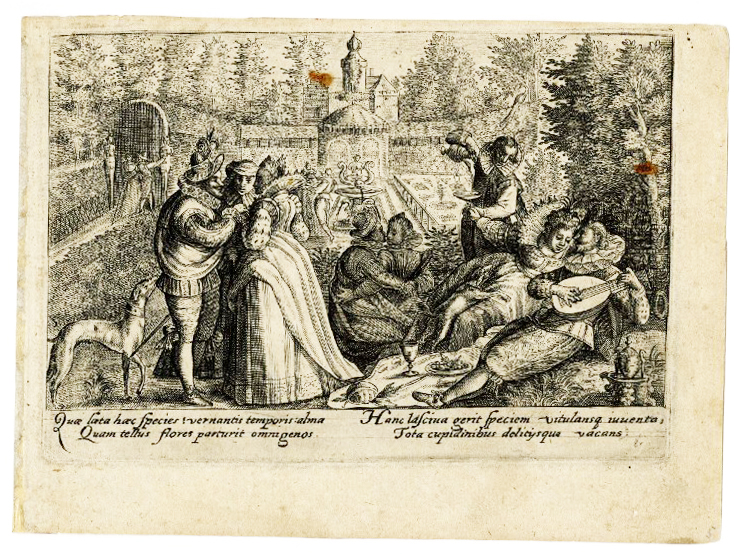 Early in the 16th century, Dutch emblem books primers or handbooks for youthful aristocrats. Among the more socially and sexually suggestive of these books are The Garden of Love [Hortus Voluptatum] (1599) and New Mirror for Youth [Nieuwen ieucht spieghel] (1617),...
Early in the 16th century, Dutch emblem books primers or handbooks for youthful aristocrats. Among the more socially and sexually suggestive of these books are The Garden of Love [Hortus Voluptatum] (1599) and New Mirror for Youth [Nieuwen ieucht spieghel] (1617),...
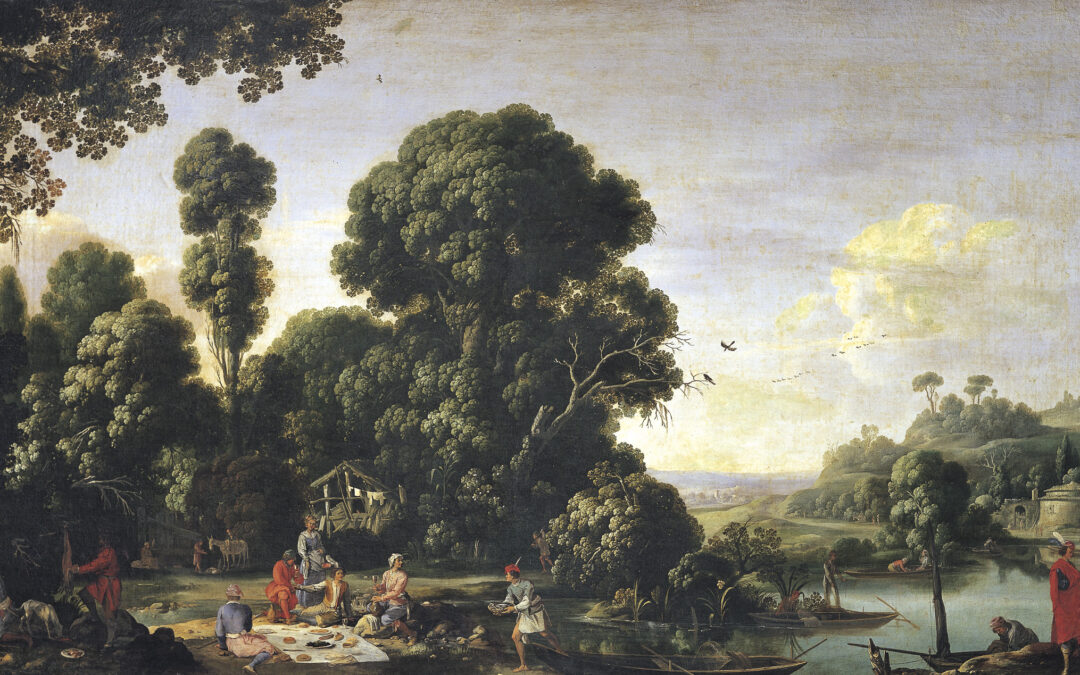 Napoletano’s Merenda sull’erba is a landscape with Florentines enjoying an informal outdoor lunch by a lake. Merenda is Italian for picnic, which was not coined until 1649 in Paris. The picnickers have spread their cloth in the shade. To the left, a cook works at a...
Napoletano’s Merenda sull’erba is a landscape with Florentines enjoying an informal outdoor lunch by a lake. Merenda is Italian for picnic, which was not coined until 1649 in Paris. The picnickers have spread their cloth in the shade. To the left, a cook works at a...
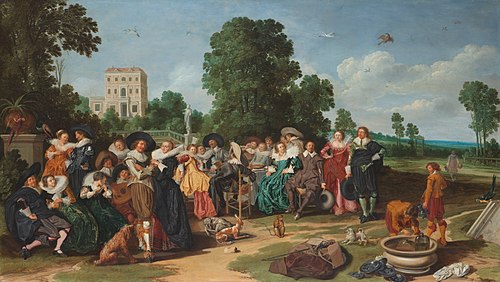 Hals’s De_buitenpartij (627) is of family and friends dining outside in the garden of their estate. It was meant to show off. Featured Image: Dirck Hals. Debuiten partij or The Fête Champetre (1627). There are two other versions of this group. Rijksmuseum, Amsterdam...
Hals’s De_buitenpartij (627) is of family and friends dining outside in the garden of their estate. It was meant to show off. Featured Image: Dirck Hals. Debuiten partij or The Fête Champetre (1627). There are two other versions of this group. Rijksmuseum, Amsterdam...
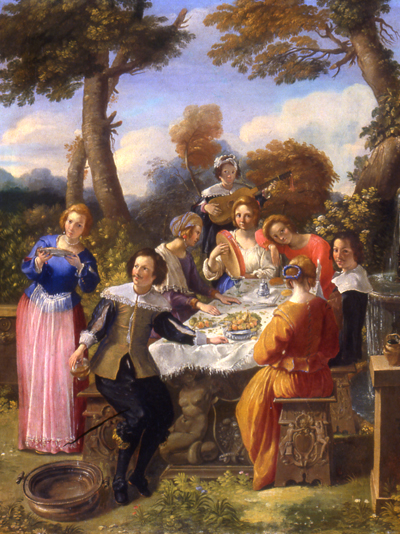 Passeri’s A Party Feasting in a Garden seems like a happy end to an alfresco luncheon. Young couples are deep in conversation, flirting, and courting, which suggests this is a garden of love. It is casual and innocent, though Passari is a moralist. Close examination...
Passeri’s A Party Feasting in a Garden seems like a happy end to an alfresco luncheon. Young couples are deep in conversation, flirting, and courting, which suggests this is a garden of love. It is casual and innocent, though Passari is a moralist. Close examination...
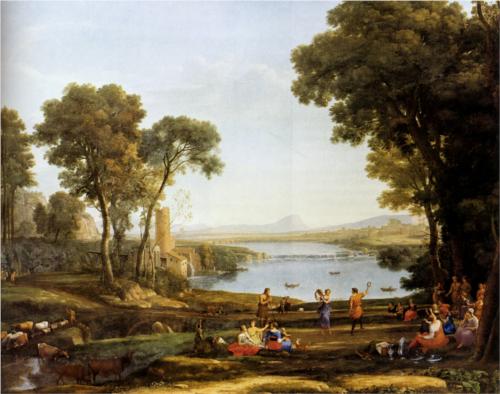 Claude should have named his painting scampagnata (holiday in the country), merenda sull’erba, or lolazione sull’erba (picnic on the grass). But Claude enhanced Landscape with the Marriage of Isaac and Rebecca with a biblical allusion to Genesis, 24, the...
Claude should have named his painting scampagnata (holiday in the country), merenda sull’erba, or lolazione sull’erba (picnic on the grass). But Claude enhanced Landscape with the Marriage of Isaac and Rebecca with a biblical allusion to Genesis, 24, the...
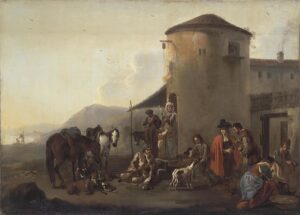 Miel’s halt on the hunt and repas de chasse depicts hunters stopped by a rustic inn. In the Prado’s La Merienda, hunters have spread a cloth beside their horses and are settling in to relax. This is a perfunctory meal of sliced ham, cheese, bread, and wine. Unlike...
Miel’s halt on the hunt and repas de chasse depicts hunters stopped by a rustic inn. In the Prado’s La Merienda, hunters have spread a cloth beside their horses and are settling in to relax. This is a perfunctory meal of sliced ham, cheese, bread, and wine. Unlike...
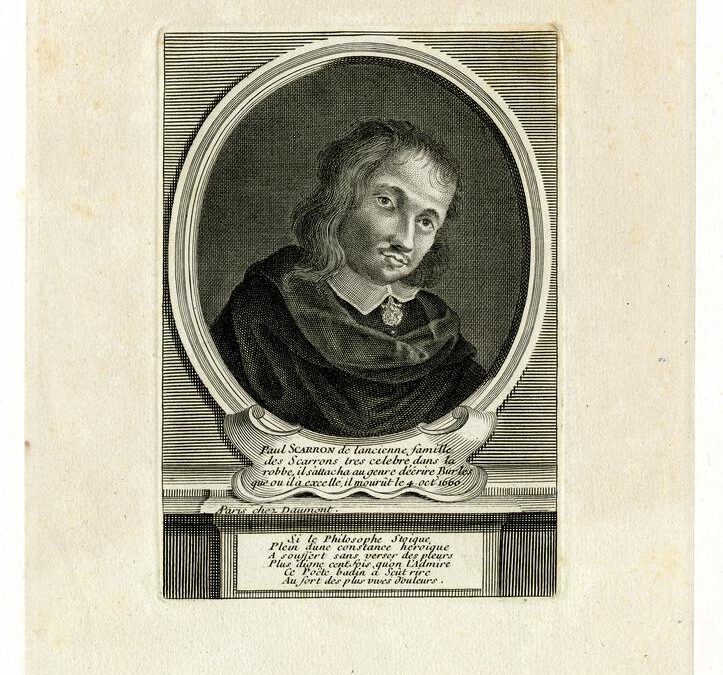 It is rumored that this is how the satirist Paul Scarron was known for his petits soupers, intimate dinners without ceremony, to which guests were invited to dine in the picnic-style, un repas dans le manière pique-nique. Oliver Goldsmith’s “Retaliation” (1774)...
It is rumored that this is how the satirist Paul Scarron was known for his petits soupers, intimate dinners without ceremony, to which guests were invited to dine in the picnic-style, un repas dans le manière pique-nique. Oliver Goldsmith’s “Retaliation” (1774)...
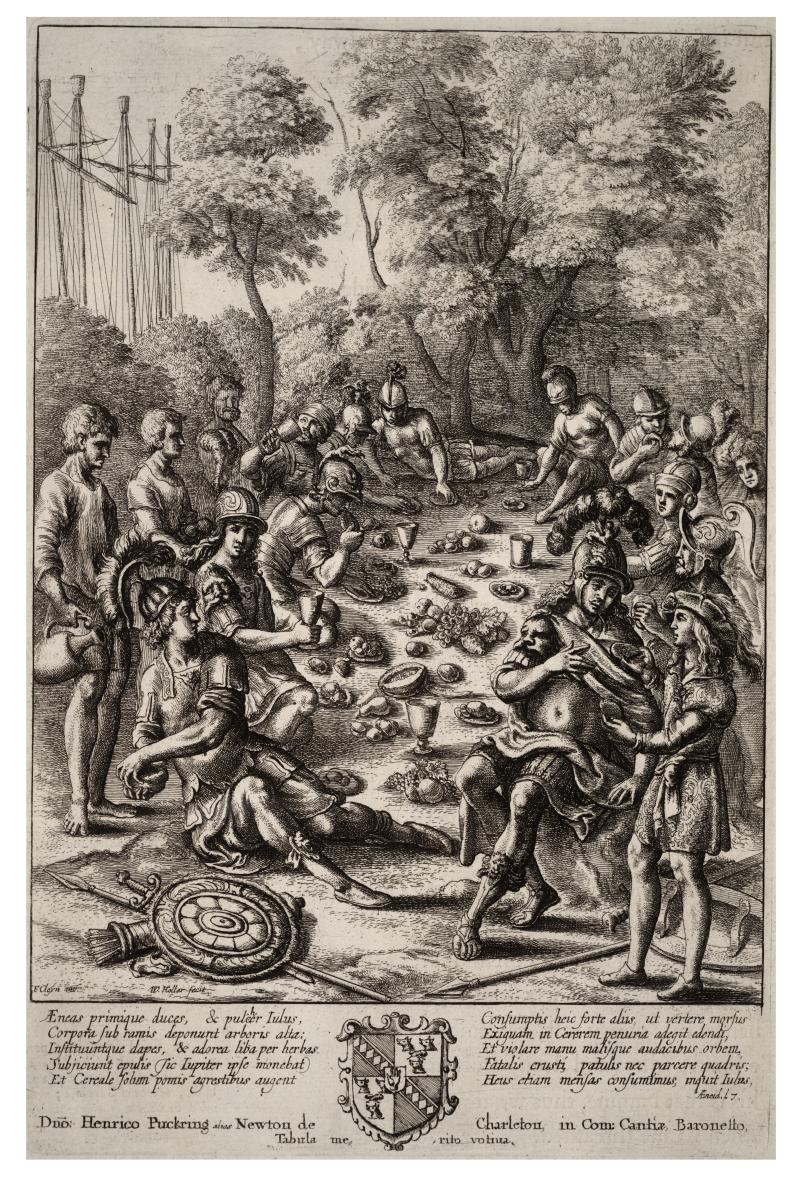 Hollar illustrates the key moment in Virgil’s Aeneid (19 CE) when Aeneas realized that he had reached the land where he would build a new city where Trojans would prosper. The chosen moment is when Aeneas and his crew bivouac in a forest clearing in Latium and...
Hollar illustrates the key moment in Virgil’s Aeneid (19 CE) when Aeneas realized that he had reached the land where he would build a new city where Trojans would prosper. The chosen moment is when Aeneas and his crew bivouac in a forest clearing in Latium and...
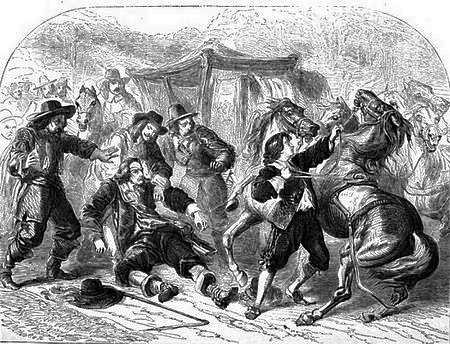 Cromwell, the Lord Protector of England, “picnicked” in Hyde Park in 1654. According to Cromwell’s secretary of state Edmund Ludlow, “His highness, only accompanied with secretary Thurloe and some few of his gentlemen and servants, went to take...
Cromwell, the Lord Protector of England, “picnicked” in Hyde Park in 1654. According to Cromwell’s secretary of state Edmund Ludlow, “His highness, only accompanied with secretary Thurloe and some few of his gentlemen and servants, went to take...
 Milton never uses the word picnic or any synonym but knows the concept and uses it freely for satiating Adam and Eve in Paradise before the Fall in Paradise Lost. Because they had no means of cooking, Milton supposes that Adam and Eve were inadvertent Vegans...
Milton never uses the word picnic or any synonym but knows the concept and uses it freely for satiating Adam and Eve in Paradise before the Fall in Paradise Lost. Because they had no means of cooking, Milton supposes that Adam and Eve were inadvertent Vegans...











